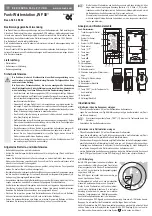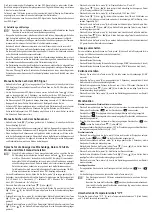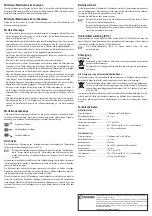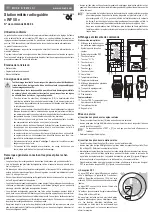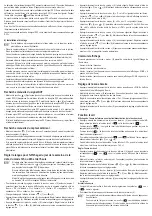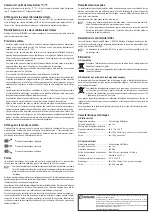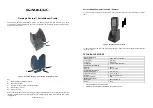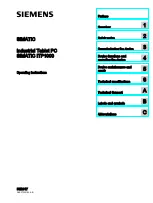
Replacing the batteries
The batteries in the weather station must be replaced if the display contrast decreases strongly
or the battery symbol appears to the right of the time displayed. If the batteries of the outdoor
sensor are empty, the weather station only displays bars as measured value.
In this case, replace the batteries with new ones.
When replacing the batteries of the weather station, all data will be lost. Proceed as
described in the section of putting the device into operation.
With a battery replacement in the outdoor sensor, you have to start a manual search
for the outdoor sensors on the weather station (otherwise, the weather station will
no longer
fi
nd the outdoor sensor).
Declaration of Conformity (DOC)
We, Conrad Electronic, Klaus-Conrad-Straße 1, D-92240 Hirschau, hereby declare that this
product conforms to the fundamental requirements and the other relevant regulations of the
directive 1999/5/EC.
The Declaration of Conformity (DOC) for this product can be found at www.conrad.
com.
Disposal
a) General
Dispose of an unserviceable product in accordance with the relevant statutory regu-
lations.
Remove any battery/rechargeable batteries inserted and dispose of them separately
from the product.
b) Disposal of used batteries/rechargeable batteries
As the end user, you are required by law (Battery Ordinance) to return all used batteries/
rechargeable batteries; disposal of them in the household waste is prohibited!
Batteries/rechargeable batteries that contain hazardous materials are labelled with
the following symbols to indicate that disposal in the household waste is forbidden.
The symbols of the relevant heavy metals are: Cd = Cadmium, Hg = Mercury, Pb =
Lead.
You can return your used batteries/rechargeable batteries free of charge at the of
fi
cial col-
lection points in your community, in our stores, or at places where batteries or rechargeable
batteries are sold!
You thereby ful
fi
l your statutory obligations and contribute to the protection of the environment!
Technical data
a) Weather station
Power supply ........................................2 batteries of the type AA/Mignon
Battery lifespan: ....................................approx. 1 year
Max. number of outdoor sensors ..........1
Temperature range ...............................-5 °C to +50 °C
Dimensions ...........................................86 x 165 x 28 mm (W x H x D), without base stand
Weight ..................................................approx. 150 g without batteries
b) Outdoor sensor
Power supply ........................................2 batteries of type AAA/Micro
Battery lifespan: ....................................approx. 1 year
Transmission frequency........................433 MHz
Transmission range ..............................up to 30 m (see chapter "Range")
Transmission interval ............................ about 43 s
Temperature range ...............................-20 °C to +60 °C
Dimensions ...........................................38 x 105 x 18 mm (W x H x D), without bracket
Weight ..................................................approx. 40 g without batteries
These operating instructions are a publication by Conrad Electronic SE, Klaus-Conrad-Str. 1,
D-92240 Hirschau (www.conrad.com).
All rights including translation reserved. Reproduction by any method, e.g. photocopy, micro
fi
lming,
or the capture in electronic data processing systems require the prior written approval by the editor.
Reprinting, also in part, is prohibited.
These operating instructions represent the technical status at the time of printing. Changes in
technology and equipment reserved.
© Copyright 2013 by Conrad Electronic SE.
Displaying minimum/maximum values
You can toggle between the display of the minimum values ("MIN" in the display), the maximum
values ("MAX" in the display) and the current measured values for the indoor and outdoor
temperature by brie
fl
y pressing the "mem" (6) button.
Resetting minimum/maximum values
Hold down the "mem" (6) button for about 3 seconds to reset all minimum and maximum values
stored.
Weather Forecast
• The weather station calculates a weather forecast for the next 12 to 24 hours from the chang-
es in the atmospheric pressure over the last few hours / days. The accuracy achievable by
this technique is about 70 - 75%.
This means that the real weather can be totally different the following day. Since the meas-
ured barometric pressure is only valid for an area with a diameter of about 30 - 50 km, the
weather can also change quickly. This is especially the case in mountainous areas and high
mountain regions.
This is why you should not rely on the weather forecast of the weather station but get some
information locally, for example when you want to hike the mountains.
• The display does not represent the momentary weather situation, but is a forecast for the next
12 to 24 hours.
• If "sunny" is displayed at night, this means a starlit night.
• In case of sudden or larger air pressure
fl
uctuations, the display symbols are updated to
indicate the weather change. If the display symbols do not change, either the air pressure did
not change or the change occurred so gradually that it cannot be registered by the weather
station.
• If the weather forecast shows "sunny" or "rain", the display won't change even if the weather
improves (display "sunny") or deteriorates (display "rain") since those symbols already dis-
play the two extreme conditions.
The symbols indicate a weather change for the better or worse, which does not have to mean
sun or rain, however, as indicated by the symbols.
• After inserting new batteries, you should not pay attention to the measuring values and
weather forecasts for the
fi
rst 12 to 24 hours, because the station must
fi
rst collect air pres-
sure data in this period at a constant height above sea level before being able to make a more
exact forecast.
• If the weather station is brought to a signi
fi
cantly higher or lower location than the original site
(e.g. from the ground
fl
oor to the upper storeys of a building) the weather station may possibly
erroneously detect a change in weather due to the change in atmospheric pressure.
Weather trend display
An icon to the top left of the display shows how the atmospheric pressure changes. As de-
scribed in the "Weather forecast" section, an increasing atmospheric pressure indicates im-
proving weather, while a falling atmospheric pressure indicates deteriorating weather.
Rising atmospheric pressure
Constant atmospheric pressure
Falling atmospheric pressure
Range
The transmission range of the radio signals between outdoor sensor and weather station is up
to 30 m under optimum conditions.
This transmission range data refers to the so-called "free-
fi
eld range". However,
this ideal arrangement (e.g. weather station and outdoor sensor on a plain, even
meadow without trees, houses etc.) never exists in practice.
Due to the different in
fl
uences on the radio transmission, no speci
fi
c range can be guaranteed.
However, trouble-free operation is usually possible in a single family house.
The range can be signi
fi
cantly reduced by proximity to cables, pipes, metal pieces, electronic
devices, and similar. Thick walls, steel construction, laminated insulated glass windows, etc.,
also reduce the range very signi
fi
cantly.
If you notice that the weather station does not contain any measured values of the outdoor
sensor, check the condition of the batteries in the outdoor sensor
fi
rst. Following that, select
another location for the weather station and the outdoor sensor. If required, perform a manual
search for the outdoor sensor (see the "Manual search for the outdoor sensor" chapter).

